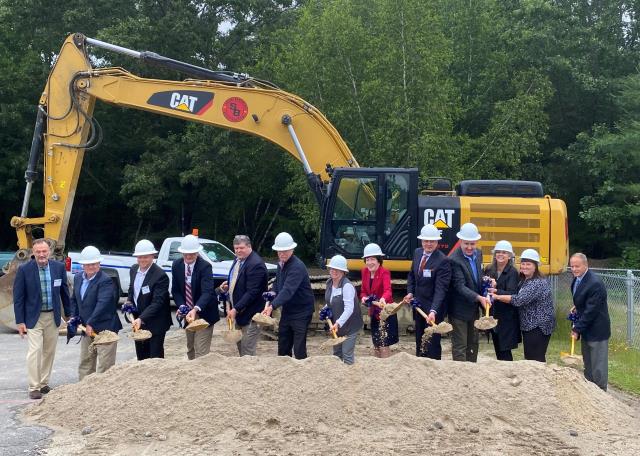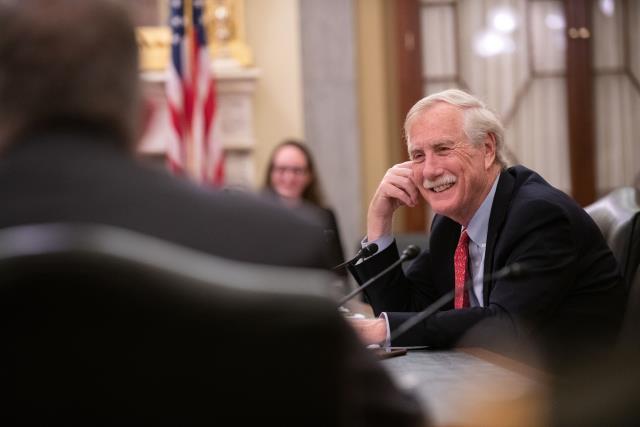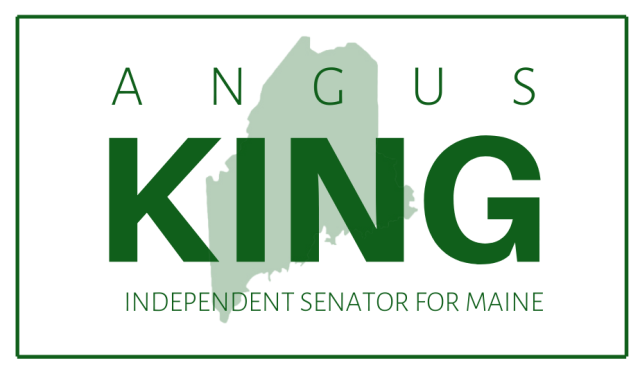A Transformational Moment for Maine

“Time and experience have verified to a demonstration, the public utility of internal improvements. That the poorest and most thinly populated countries would be greatly benefited by the opening of good roads, and in the clearing of navigable streams within their limits, is what no person will deny.”
That's what Abe Lincoln said in 1832, when he was running for the Illinois legislature. Nearly 200 years later, his words are still just as true: there are few investments more important or with more benefits than those in public infrastructure – especially in rural communities like Maine's. In the 21st century, this doesn't just mean roads and bridges, it also means affordable, reliable, high-speed internet access. Every Maine family and business needs access to these connections, just like they need access to a road or running water.
After years of bipartisan work to make this vision a reality, I was beyond excited to join Governor Janet Mills in Augusta this week to announce that Maine will receive $272 million to expand high-speed internet access under the Bipartisan Infrastructure Law’s Broadband Equity, Access, and Deployment (BEAD) Program. Along with funding from the American Rescue Plan and other state programs, this means that Maine will be receiving around $500 million to connect every community and household across the state.
Just like Lincoln's rural road-building in the 1830s, or the rural electrification effort in the1930s, these broadband investments are going to be a game-changer. This technology will help connect thousands of Maine households and businesses to the infrastructure that powers modern life, and enable communities across the nation to fully engage in the 21st century economy. As remote work becomes more accepted, it'll also help bring more people to our state, because if you can work or visit with your doctor from wherever you live instead of the other way around, why would you live anywhere but Maine.
Out of everything we've done in Washington over the last few years, this may be the most important. Together, I look forward to using these generational investments to lay the foundation for Maine’s 21st century success and make sure even our most rural areas aren’t left behind.
Broadening Career Options for Military Spouses

Military families make many sacrifices while defending America’s freedom and democracy, and too often, this includes spouses putting aside careers or turning down opportunities to pursue their American dream. Enough is enough. It is past time that our government did more to support our military's spouses and family members which is why I'm excited that a new bill has unanimously passed the Senate.
The Military Spouse Employment Act is a commonsense bipartisan bill aimed at helping military spouses avoid tough choices between family and employment by providing stable, remote positions in the federal government.
A recent survey found that 43 percent of active duty families have reported that spousal unemployment is an issue for them, and 42 percent of military spouses reported they are not in the labor force and 33 percent of spouses said the reason they aren’t working was because their family will relocate soon because of new military orders.
This legislation allows military spouses to have a remote work career with any federal agency, which would allow them to build a career while they move with their spouse.
This country is forever indebted to our military families and the sacrifices they have made to support our servicemembers. I encourage the House to quickly pass this essential legislation so it can head to the President's desk to be signed into law.
Bipartisan Plans to Address Affordable Housing Shortages

Maine is experiencing a shortage of affordable housing, with only 51 homes for every 100 renters that have extremely low incomes (ELI). In fact, fifty-eight percent of the state’s ELI renters spend more than half of their incomes on rent, and with the summer tourism season in full swing, Maine's small businesses have frequently cited the affordable housing gap as one of the biggest hurdles to finding and retaining employees.
As families and businesses across Maine struggle with the lack of affordable housing, I got to work with my colleagues to cosponsor bipartisan legislation that will create nearly two million new affordable homes across the country – including thousands in Maine.
The Affordable Housing Credit Improvement Act, introduced with Republican Senator Todd Young of Indiana, would build on the success of the Low-Income Housing Tax Credit to create millions of new affordable housing units in the communities that need them the most. It’s a bipartisan, commonsense effort to help families find housing that fits their budget. In fact, it would provide more homes for low-income people, support small businesses trying to attract workers, and fill the state’s gap of more than 20,000 affordable housing units.
This bill is an important step to address the housing shortages facing the country and I hope we can get it passed quickly for the benefit of families, small businesses, and entire communities.
This month I also took the time to sit down with Senator Young on my 'Inside Maine' podcast to discuss the local impacts of the affordable housing shortage. We are both fully aware of the effects on Maine people and Hoosiers – and look forward to continued bipartisan work addressing this problem.
Significant Investments for Maine Infrastructure
One of my favorite parts of my job is traveling the state and meeting with all the good people who are working to make Maine an even better place to live. I’ve always found that one day of seeing is worth at least a hundred of reading, and this month in Windham, Brunswick, Augusta, and Bangor, that was certainly the case.

The month kicked off with the announcement of $2,000,000 for a new wastewater treatment facility in Windham – the culmination of great partnerships between local, state, and federal governments working diligently together. This new wastewater facility will help the town modernize its infrastructure to attract new businesses and provide families with a high-quality of life – all while carefully preserving local ecosystems. Thanks to this new wastewater facility, Windham will remain one of Maine’s most vibrant communities.

Maine's economy is leading the country in our motto of "work where you live" instead of "live where you work." This month, I spent some time visiting with both small and large businesses that are bringing jobs back to Maine while helping to revitalize essential business districts like Skowhegan, Freeport, and Portland. Maine is one of the best places to raise a family, grow a business or visit for vacation, and this development will help our state lead the way for employees to maintain a healthy work/life balance.

If you want to feel good about Maine’s future, spend some time speaking with our students studying science, technology, engineering, and mathematics (STEM) about the innovative projects that are going to take Maine to space. In a visit with NASA Administrator and former Senator Bill Nelson, and Governor Mills, we visited with entrepreneurs and students who are leading the way for mankind to explore alternative universes. Maine really is the future.
Every visit was a great learning experience and a powerful reminder of why our state’s future is bright. With caring, committed communities like ours, there’s nothing we can’t accomplish together.
Expanding Support for Maple Syrup Producers

There’s nothing better than real Maine maple syrup on Sunday morning pancakes – except for, maybe, maple syrup on the other six days of the week. With growing competition from large producers across the United States, I introduced legislation to support our local Maine syrup producers.
The Market Access, Promotion and Landowner Education Support for Your Regionally Underserved Producers (MAPLE SYRUP) Act would increase funding from $20 million to $30 million for the federal maple support program. The program supports the U.S. maple syrup industry through research and education, natural resource sustainability, and the marketing of maple syrup and maple-sap products.
Building on the federal syrup support program and promoting America’s maple syrup producers is a smart way to grow the industry and provide the sweet condiment to more people across the region and country.
A Promising Opportunity to Advance Maine Forest Priorities

Despite what you may hear, the last few years in Congress have been among the most productive and bipartisan in decades. Since the start of 2020, we’ve passed a much-needed infrastructure package; made historic investments in clean, affordable energy; and spurred the return of cutting-edge American manufacturing. But the work doesn’t stop there – I’m hopeful that over the coming months and years, we’ll build on this momentum with more bipartisan accomplishments.
One of the most promising pieces of upcoming legislation is the Farm Bill: a large package of bipartisan legislation that’s passed every five years to shape agricultural policy – including forestry and logging. Maine is no stranger to these issues. Farming and forestry are inseparable from our history, culture, and economic success. As Congress begins to shape the Farm Bill, we need to ensure feedback and priorities from our state's communities are included.
Seeing recent expansions at Sappi Skowhegan, LP Houlton, and Timber HP in Madison, it’s clear that the success of Maine’s logging industry depends on our ability to embrace new opportunities like cross laminated timber (CLT), renewable wood energy, and other 21st Century forest products. One of the major drivers of these game-changing innovations has been the federal Wood Innovation Grant (WIG) Program, which has invested millions of dollars in Maine projects like The University of Maine’s wood-based 3D printed home.
The Farm Bill is another chance to build on the success of this community-supporting program and bring further development to our state. I hope to significantly expand the size and number of Wood Innovation Grants, use the funding to encourage research in especially promising technologies, and increase the amount of matching funds available to Maine organizations.
The Farm Bill should also include more grants for schools and training organizations to teach people how to design, build, and innovate with wood, including mass timber. It’s a commonsense way to support further development of the industry while expanding the careers available to our younger generations.
Maine’s promising logging projects and new markets all rely on keeping our forests healthy for decades to come, making it imperative that we understand the impacts of the changing climate. Congress should use the bill to secure the future of our forests and expand the vital U.S. Forest Service’s Forest Inventory and Analysis (FIA) Program that provides forest data and recommendations to loggers and forest owners. With better information and analysis, we can successfully navigate our shifting climate and continue to invest in Maine’s forest future.
I’ll continue working to ensure the final Farm Bill package includes feedback from Maine people, including dairy producers, lobstermen, and crop farmers. Together, I’m confident that we can keep up the good, bipartisan work and continue to strengthen Maine communities.
June Policy Update

As a reminder, you can read more on my regularly updated press release page at king.senate.gov. Here are some other priorities I’ve been working on.
- Creating Aquaculture Office to Better Support Farmers and Harvesters. The Sustaining Healthy Ecosystems, Livelihoods, and Local Seafood (SHELLS) Act will create a designated office for aquaculture within the U.S. Department of Agriculture (USDA) to assist shellfish harvesters and seaweed farmers, improve food security, and strengthen coastal communities. Read more HERE.
- Supporting Veterans with Mental Traumas. The Discharge Review Board Accountability Act would help veterans who received a less than honorable discharge due to behavior tied to service-related mental conditions. The legislation would study the current reconsideration process and make suggestions for how it can improve. Read more HERE.
- Securing Investments for Maine Shipyards and Military Servicemembers in the Annual Defense Bill. The bipartisan 2024 National Defense Authorization Act (NDAA) includes two Arleigh Burke-class destroyers that Bath Iron Works (BIW) can compete to build, the largest pay raise in over 20 years for servicemembers, provisions to study the security threats posed by artificial intelligence, and additional resources to prevent illegal drugs from entering the country. Read more HERE.
- Fighting Maine’s Opioid Epidemic with DoD Training for Mexican Military. The Partnership for Advancing Regional Training and Narcotics Enforcement Response Strategies (PARTNERS) Act would allow the Department of Defense (DoD) to train Mexican military forces in counter-drug tactics to stop cartels in Mexico from transporting illegal drugs across the border and into the United States. Read more HERE.
- Protecting Maine's Wildlife. The bipartisan Recovering America’s Wildlife Act (RAWA) would invest in conservation strategies led by states, territories, and Tribal nations to support the long-term health of fish and wildlife habitats all across America. These locally-driven, science-based strategies would restore species with the greatest conservation need. Read more HERE.
Hearing Highlights
We’ve had a busy month of hearings in the Senate Armed Services, Veterans’ Affairs, Intelligence, and Energy and Natural Resources Committees. Here are some of the highlights:
In a hearing of the Senate Energy and Natural Resources (ENR) Committee, I questioned James Robb – President & CEO of the North American Electric Reliability Corporation – about how fast the nation can transition from fossil fuel to renewable energy sources, and what the tradeoffs of the transition will be.
In a hearing of the Senate Veterans' Affairs Committee, I questioned top officials from the Department of Veterans Affairs (VA) and the Centers for Medicare and Medicaid Services about a number of challenges with homecare and nursing homes facing Maine’s veterans community.
As much of the country felt the impacts of Canadian wildfires, I pushed top Biden administration officials to consider simple and effective methods to improve forest management across the United States in a hearing of the Energy and Natural Resources Committee.
In The News

Thanks for subscribing to my monthly newsletter! I would love to hear your ideas for how we can make Maine and our country a better place. Please feel free to reach out with any questions, comments, or concerns by visiting: https://www.king.senate.gov/contact –we look forward to hearing from you.
All the best!

To unsubscribe to this e-Newsletter click HERE.
|